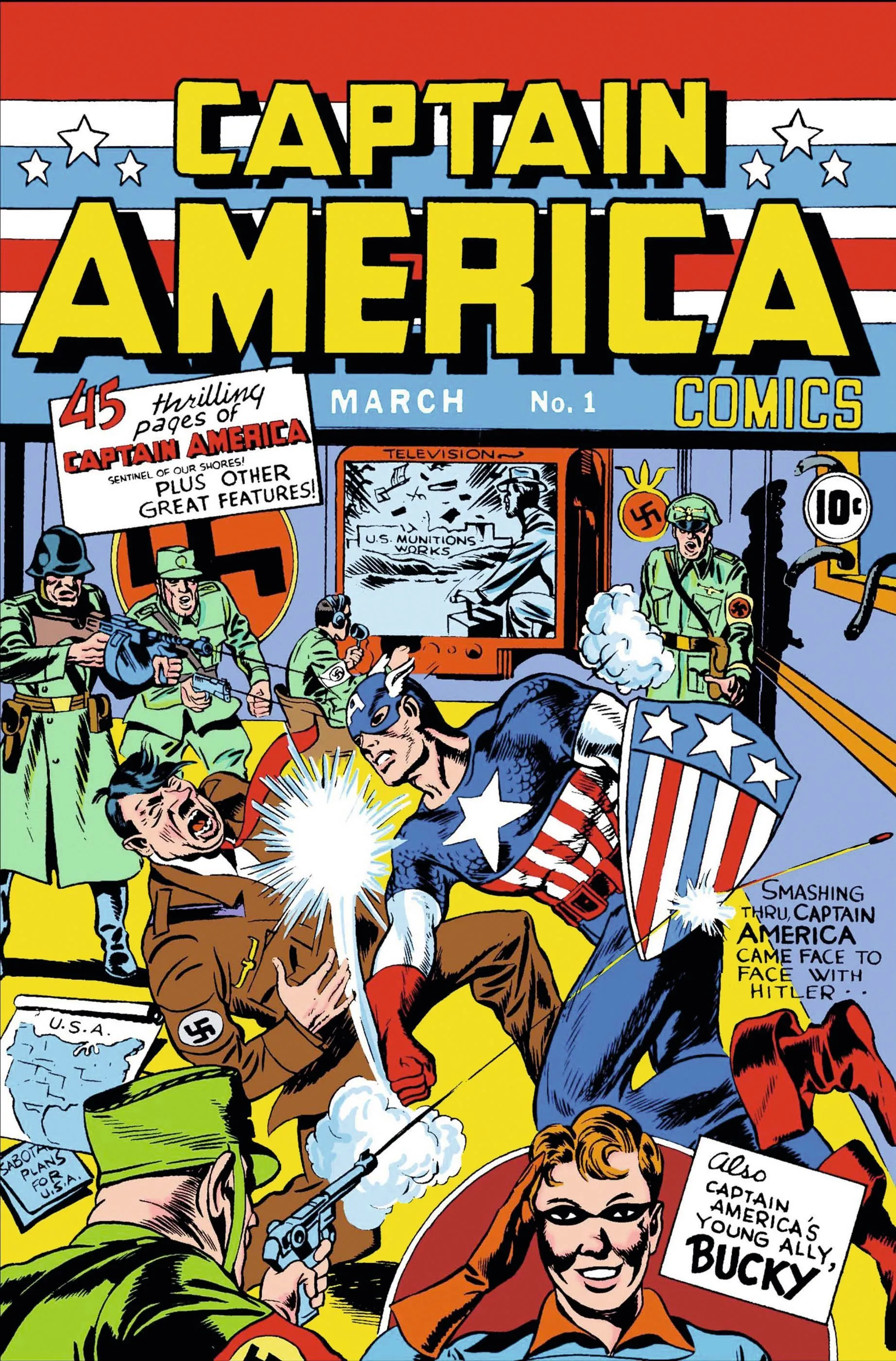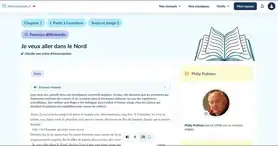Unit 5
Activity 1 - Group
Differentiation
From WWII to the Cold War
Ressource affichée de l'autre côté.
Faites défiler pour voir la suite.
Faites défiler pour voir la suite.
Group 1 An article
Each group is in charge of one document. Study it and
Ressource affichée de l'autre côté.
Faites défiler pour voir la suite.
Faites défiler pour voir la suite.
Text documentA Hero for a Good War
In March 1941, months before the United
States would officially enter the Second World
War, Adolf Hitler took a massive hit from American
forces. The strike was orchestrated by two
Jewish-Americans, and was witnessed by well over
a million people. The event in question was not a
military operation, nor was it strictly-speaking
real, but it nonetheless helped shape the American
perception of Hitler, Germany, and the war
in Europe.
This historic meeting between Adolf Hitler and the fist of American heroism took the form of the publication of the first issue of Captain America from Timely Comics. The cover of issue one featured a star-spangled Captain America in a room full of Nazis, punching Hitler in the face hard enough to knock him over. At no point in the actual story does Cap actually encounter Hitler, much less punch him in the face, but this didn't seem to be a problem to readers. This issue was wildly successful and sold over a million copies, securing Captain America's existence as an American wartime staple before the war had even officially started for Americans.
Captain America #1 started a trend that would carry on past the war – the blurring of the line between fiction and reality when it comes to the major players of World War Two. [...] Literally, Hitler and the Nazi party were the villains Captain America was fighting in each issue of the comics, but figuratively, and more interestingly, Nazis are remembered as being something analogous to comic book villains.
This historic meeting between Adolf Hitler and the fist of American heroism took the form of the publication of the first issue of Captain America from Timely Comics. The cover of issue one featured a star-spangled Captain America in a room full of Nazis, punching Hitler in the face hard enough to knock him over. At no point in the actual story does Cap actually encounter Hitler, much less punch him in the face, but this didn't seem to be a problem to readers. This issue was wildly successful and sold over a million copies, securing Captain America's existence as an American wartime staple before the war had even officially started for Americans.
Captain America #1 started a trend that would carry on past the war – the blurring of the line between fiction and reality when it comes to the major players of World War Two. [...] Literally, Hitler and the Nazi party were the villains Captain America was fighting in each issue of the comics, but figuratively, and more interestingly, Nazis are remembered as being something analogous to comic book villains.
This phenomenon can be attributed,
at least in part, to very successful indoctrination
by way of propaganda, especially the propaganda
directed at children, like comic books. By making
the real-world major players of World War Two,
especially America's enemies, into fictional characters
in a medium as easily consumed as comics,
Captain America helped to mythologize the war
and its participants.
When I say “mythologize”, I don't simply mean that we remember the war as a narrative – people have a tendency to do that with most historical events. A narrative becomes a myth when public memory ascribes a morality to that narrative. American tradition remembers World War Two not as a multi-nation war fought between the Allies and the Axis, but rather as a moral conflict between Allied “good guys” and Axis “bad guys”.
When I say “mythologize”, I don't simply mean that we remember the war as a narrative – people have a tendency to do that with most historical events. A narrative becomes a myth when public memory ascribes a morality to that narrative. American tradition remembers World War Two not as a multi-nation war fought between the Allies and the Axis, but rather as a moral conflict between Allied “good guys” and Axis “bad guys”.
A Hero for a Good War
Ressource affichée de l'autre côté.
Faites défiler pour voir la suite.
Faites défiler pour voir la suite.
Group 2 A magazine cover
Each group is in charge of one document. Study it and
Ressource affichée de l'autre côté.
Faites défiler pour voir la suite.
Faites défiler pour voir la suite.
PictureCaptain America Comics


Ressource affichée de l'autre côté.
Faites défiler pour voir la suite.
Faites défiler pour voir la suite.
Group 3 A video
Each group is in charge of one document. Study it and
Ressource affichée de l'autre côté.
Faites défiler pour voir la suite.
Faites défiler pour voir la suite.
Ressource affichée de l'autre côté.
Faites défiler pour voir la suite.
Faites défiler pour voir la suite.
Questions
You are in charge of one document.
Share your findings with you classmates and learn about the other documents.
1
Present your document. What is striking in it?
2
Pick out details about the historical context of your
document. Go on the Internet to learn more about it.
3
What makes it a form of propaganda?
Useful vocabulary
It was published (text) / released (video) in…
Let's talk this out!
Group work
Mediation
Share your findings with you classmates and learn about the other documents.
4
What are the similarities and differences between your documents?
5
Why was it necessary at the time for comics to convey this message of propaganda? Do you think it was effective?
6
Do you like comic books? Why or why not?
Useful vocabulary
By this time, there was / were… The country was ravaged by…
Comic books appeal to me ≠ I'm not a great fan of...
Comic books appeal to me ≠ I'm not a great fan of...
Ressource affichée de l'autre côté.
Faites défiler pour voir la suite.
Faites défiler pour voir la suite.
Toolbox
- automatic rifle (n.)
- issue /ˈɪˌʃuː/ (n.)
- lively colours (n.)
- shield / mask (n.)
- soldiers (n.)
- steretoypes (n.)
- swastika /ˈswɒstɪkə/ (Nazi's emblem) (n.)
- exaggerate (v.)
- knock /ˈnɒk/ off (v.)
- shoot (v.)
Ressource affichée de l'autre côté.
Faites défiler pour voir la suite.
Faites défiler pour voir la suite.
V-ing
a. Observez les mots en gras dans le texte.
b. Classez-les dans ces catégories : verbe (1), nom (2), adjectif (3).
Précis grammatical ,
Ressource affichée de l'autre côté.
Faites défiler pour voir la suite.
Faites défiler pour voir la suite.
La traduction de « toujours »
- Always (éternellement) : Comics have always been popular.
- Still (encore) : He is still very popular.
- Forever (pour toujours) : Captain America will embody democracy forever.
Attention !
Toujours pas : not yet
Ressource affichée de l'autre côté.
Faites défiler pour voir la suite.
Faites défiler pour voir la suite.
Guessing game
Select four words and expressions from this double page and prepare a definition for each to make the class guess what it is.Ressource affichée de l'autre côté.
Faites défiler pour voir la suite.
Faites défiler pour voir la suite.
Over to you!
Ressource affichée de l'autre côté.
Faites défiler pour voir la suite.
Faites défiler pour voir la suite.
Une erreur sur la page ? Une idée à proposer ?
Nos manuels sont collaboratifs, n'hésitez pas à nous en faire part.
j'ai une idée !
Oups, une coquille

